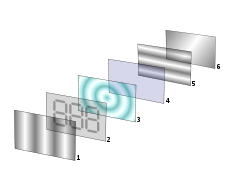

A segmented liquid-crystal display (segmented LCD) is a type of liquid-crystal display commonly used for showing numerical or limited character information, primarily in devices like calculators and digital watches.
Segmented LCDs often display information in a one-line format. They can have 7-segment digits, or 14- or 16-segment characters. Segments can be arbitrary shapes and sizes.
Segmented LCDs were built into the Game & Watch series of handheld electronic games.
HP produced segmented LCDs for the HP-41C series of calculators.
Construction
8- and 16-segment LCDs are made as a stack of two glass sheets, each patterned with transparent electrodes, typically using indium tin oxide (ITO). Liquid crystal is filled between the two sheets. Typically, the rear glass is all one common electrode.
Layers

- Polarizing filter film with a vertical axis to polarize light as it enters.
- Glass substrate with ITO electrodes. The shapes of these electrodes will determine the shapes that will appear when the LCD is switched ON. Vertical ridges etched on the surface are smooth.
- Twisted nematic liquid crystal. It normally rotates the light's polarization by 90°. But if the surrounding electrodes are charged, the light's polarization won't be rotated.
- Glass substrate with common electrode film (ITO) with horizontal ridges to line up with the horizontal filter.
- Polarizing filter film with a horizontal axis. Light whose polarization was rotated by the liquid crystal will pass through, but light that wasn't rotated will be blocked.
- Reflective surface to send light back to viewer. (In a backlit LCD, this layer is replaced or complemented with a light source.)
History

See Liquid-crystal display#History.
The first liquid crystal display was developed by a team of engineers led by George Heilmeier.
References
- Certain High-information Content Flat Panel Displays and Display Glass Therefor from Japan: Determination of the Commission Investigation No. 731-TA-469, Final Under the Tariff Act of 1930, Together with the Information Obtained in the Investigation. USITC publication. U.S. International Trade Commission. 1991. p. PA19. Retrieved 2025-01-06.
- "Definition of LCD types". PCMAG. Retrieved 2025-01-06.
- Mansell, R.; Ang, P.H.; Steinfield, C.; van der Graaf, S.; Ballon, P.; Kerr, A.; Ivory, J.D.; Braman, S.; Kleine, D.; Grimshaw, D.J. (2015). The International Encyclopedia of Digital Communication and Society, 3 Volume Set. ICAZ - Wiley Blackwell-ICA International Encyclopedias of Communication. Wiley. p. 611. ISBN 978-1-118-29074-3. Retrieved 2025-01-06.
- ^ "The First HP Liquid Crystal Display". www.hpmuseum.org. Retrieved 2025-01-06.
- Handbook of Visual Display Technology. Heidelberg ; New York: Springer. pp. 419–420. ISBN 978-3-540-79566-7. OCLC 429183490.
- "Milestones:Liquid Crystal Display, 1968". ETHW. 2023-12-19. Retrieved 2025-01-06.
| This article needs additional or more specific categories. Please help out by adding categories to it so that it can be listed with similar articles. (January 2025) |